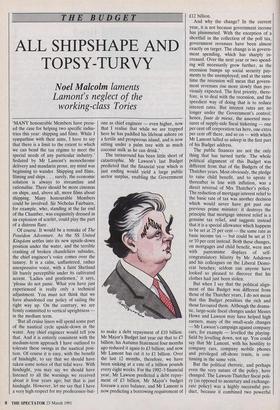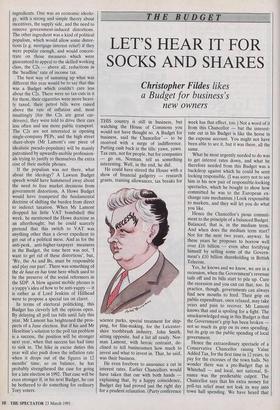THE BUDGET
ALL SHIPSHAPE AND TOPSY-TURVY
Noel Malcolm laments
Lamont's neglect of the working-class Tories
'MANY honourable Members have press- ed the case for helping two specific indus- tries this year: shipping and films. While I sympathise with their aims, I have to say that there is a limit to the extent to which we can bend the tax regime to meet the special needs of any particular industry.' Sedated by Mr Lamont's monochrome delivery and mandarin prose, my mind was beginning to wander. Shipping and films, filming and ships. . . surely, the economic solution is always to streamline and rationalise. There should be more cinemas on ships, and, above all, more films about. shipping. Many honourable Members could be involved. Sir Nicholas Fairbairn, for example, who, standing at the far end of the Chamber, was exquisitely dressed in an explosion of scarlet, could play the part of a distress flare.
Of course. It would be a remake of The Poseidon Adventure. As the SS United Kingdom settles into its new upside-down position under the water, and the terrible crashing of broken chandeliers subsides, the chief engineer's voice comes over the tannoy. It is a calm, unflustered, rather unexpressive voice, with a faint Shetland lilt barely perceptible under its cultivated accent. 'Ladies and gentlemen,' it says, 'please do not panic. What you have just experienced is really only a technical adjustment. You must not think that we have abandoned our policy of sailing the right way up. On the contrary, we are firmly committed to vertical uprightness — in the medium term.
Tut all cruise liners will spend some part of the nautical cycle upside-down in the water. Any chief engineer would tell you that. And it is entirely consistent with the medium-term approach I have outlined to tolerate these swings in the nautical posi- tion. Of course it is easy, with the benefit of hindsight, to say that we should have taken some notice of that tidal wave. With hindsight, you may say we should have listened to all the warnings we received about it four years ago; but that is just hindsight. However, let me say that I have a very high respect for my predecessor-but- one as chief engineer — even higher, now that I realise that while we are trapped here he has paddled his lifeboat ashore on a fertile and prosperous island, and is now sitting under a palm tree with as much coconut milk as he can drink.'
The turnaround has been little short of catastrophic. Mr Lawson's last Budget predicted that the financial year which is just ending would yield a large public sector surplus, enabling the Government to make a debt repayment of £10 billion. Mr Major's Budget last year cut that to £7 billion; his Autumn Statement four months ago reduced it again to £3 billion; and now Mr Lamont has cut it to £1 billion. Over the last 12 months, therefore, we have been sinking at a rate of a billion pounds every eight weeks. For the 1992-3 financial year, Mr Lawson predicted a debt repay- ment of £3 billion, Mr Major's budget foresaw a zero balance, and Mr Lamont is now predicting a borrowing requirement of £12 billion.
And why the change? In the current year, it is not because government income has plummeted. With the exception of a shortfall in the collection of the poll tax, government revenues have been almost exactly on target. The change is in govern- ment spending, which has sharply in- creased. Over the next year or two spend- ing will necessarily grow further, as the recession bumps up social security pay- ments to the unemployed; and at the same time the recession will mean that govern- ment revenues rise more slowly than pre- viously expected. The first priority, there- fore, is to deal with the recession, and the speediest way of doing that is to reduce interest rates. But interest rates are no longer under the Government's control; hence, faute de mieux, the assorted mea- sures of supply-side fiscal tinkering — one per cent off corporation tax here, one extra per cent off there, and so on — with which Mr Lamont lulled us asleep in the first part of his Budget address.
The public finances are not the only thing that has turned turtle. The whole political alignment of this Budget was different from that of the Budgets of the Thatcher years. Most obviously, the pledge to raise child benefit, and to uprate it thereafter in line with inflation, was a direct reversal of Mrs Thatcher's policy. The reduction of mortgage interest relief to the basic rate of tax was another decision which would never have got past our previous prime minister: it destroys the principle that mortgage interest relief is a genuine tax relief, and suggests instead that it is a special allowance which happens to be set at 25 per cent — the same rate as basic income tax — but could be set at 15 or 10 per cent instead. Both these changes, on mortgages and child benefit, were met with pantomime displays of self- congratulatory hilarity by Mr Ashdown and his colleagues on the Liberal Demo- crat benches; seldom can anyone have looked so pleased to discover that his clothes had. just been stolen.
But when I say that the political align- ment of this Budget was different from those of the Thatcher years, I do not mean that this Budget penalises the rich and those favoured them. Although the drama- tic, large-scale fiscal changes under Messrs Howe and Lawson may have helped high earners, many of the small-scale changes — Mr Lawson's campaign against company cars, for example — levelled the playing- field by levelling down, not up. You could say that Mr Lamont, with his hostility to company cars, company mobile phones and privileged off-shore trusts, is con- tinuing in the same vein.
But the political rhetoric, and perhaps even the very nature of the policy, have changed. The Lawson-Thatcher fiscal poli- cy (as opposed to monetary and exchange- rate policy) was a highly successful pro- duct, because it combined two powerful ingredients. One was an economic ideolo- gy, with a strong and simple theory about incentives, the supply side, and the need to remove government-induced distortions. The other ingredient was a kind of political populism, which would allow some distor- tions (e.g. mortgage interest relief) if they were popular enough, and would concen- trate on those measures which were guaranteed to appeal to the skilled working class, the C2s — above all, reductions in the 'headline' rate of income tax.
The best way of summing up what was different this year would be to say that this was a Budget which couldn't care less about the C2s. There were no tax-cuts in it for them, their cigarettes were more heavi- ly taxed, their petrol bills were raised above the rate of inflation and, most insultingly (for the C2s are great car- drivers), they were told to drive their cars less often and use more public transport. The C2s are not interested in opening single-company PEPs, and the high street share-shops (Mr Lamont's one piece of idealistic pseudo-populism) will be mainly patronised by upwardly-mobile profession- als trying to justify to themselves the extra cost of their mobile phones.
If the populism was not there, what about the ideology? A Lawson Budget speech would have hammered away about the need to free market decisions from government distortions. A Howe Budget would have trumpeted the fundamental doctrine of shifting the burden from direct to indirect taxation. When Mr Lamont dropped his little VAT bombshell this week, he mentioned the Howe doctrine as an afterthought; but he could scarcely pretend that this switch to VAT was anything other than a clever expedient to get out of a political mess. And as for the anti-perk, anti-higher-taxpayer measures in the Budget, the tone here was not, 'I want to get rid of these distortions', but, 'We, the As and Bs, must be responsible and play our part'. There was something of the de haut en bas tone here which used to be the preserve of the social reformers in the SDP. A blow against mobile phones is a yuppy's idea of how to be anti-yuppy — it is rather as if Lord Jenkins of Hillhead were to propose a special tax on claret. In terms of electoral politicking, this Budget has cleverly left the options open. By delaying all poll tax bills until July this year, Mr Lamont has brightened the pros- pects of a June election. But if his and Mr Hese!tine's solution to the poll tax problem is a success, the position will be stronger next year, when that success has had time to sink in. The hike in excise duties this year will also push down the inflation rate when it drops out of the figures in 12 months' time; so on balance, he has probably strengthened the case for going for a late election in 1992. That case will be even stronger if, in his next Budget, he can be bothered to do something for ordinary Tory voters.



























































 Previous page
Previous page